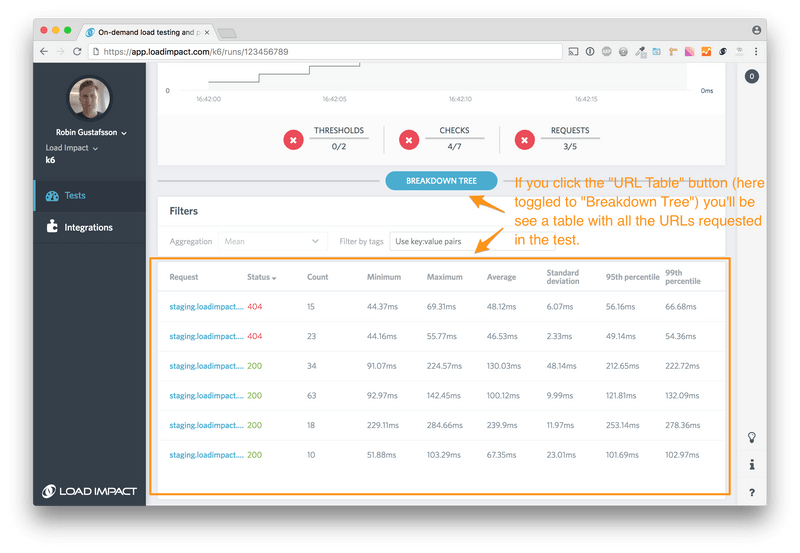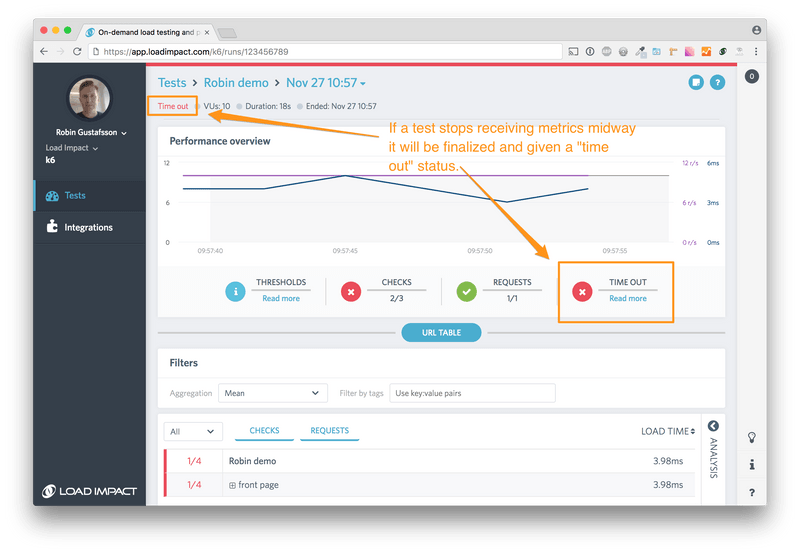This month we have more updates to share around k6 (our new and open source load testing tool) and LoadImpact Insights. In the last product update email we mentioned we have some major improvements to our product in the works. To be more specific, we can now share with you that we’re building a new version of the LoadImpact product on top of k6 and with Insights as the result experience for k6 based tests. This means that k6 tests will get a new execution mode. Besides being executable locally on machines that you manage yourself, it will be possible to execute k6 tests on globally distributed infrastructure managed by us in the cloud. The result analysis for both modes of execution will be available through Insights.
We’re striving to deliver a product that targets a more modern, collaborative and automated, way of delivering software, where a developer-centric solution is needed to get the proper buy-in from developers as they get load testing responsibility added on their shoulders when parts of it gets shifted left from QA.
What this all means for our current customers and users is that the product will get a major update in the next few months. Noteworthy is that the user scenario scripting language will change from Lua to JavaScript, and we’ll add support for both HTTP/2 and WebSockets. Subscriptions bought today will still be valid when the updated product is made generally available and the current version of the product will remain available in parallel with the new for the foreseeable future. Currently we have not planned an end-of-life date for the Lua based product offering, so there's no rush to migrate scripts if you have tons of Lua scripts in our tool.
Oh, and if you’re a customer and would like to join the early access program for the new product, which will start in the next few weeks, let us know 👍
New k6 release
We have finally packaged and released a new version of k6, v.0.18.0. Lots of goodies in this release on the march towards a v1.0 (some of the below were announced already in the previous product update email).
- jQuery API compatibility: A big PR was merged in the past month that means k6 now has the full (well, except a few nonsensical CSS and layout/rendering related APIs) jQuery API implemented on the object returned when calling html() on a HTTP response object.
- Modules: Much faster loading of external ES5 libraries. Why transpile if you don’t have to :)
- Reworked CLI: A big refactor which makes the CLI more consistent for users and easier for us to extend moving forward.
- Encodings: A "k6/encoding” module that includes base64 encoding/decoding functionality
- Cookies: There’s now a comprehensive cookie API, no need to manipulate headers anymore when working with cookies.
- TLS: version, cipher suite and OCSP stapling information is now available as properties on each response object.
- Per-request redirect option: You can now specify how to deal with redirects on a per-request basis.
- HTTP: You can now pass objects to http.batch(), in addition to passing arrays with ordered request parameters.
We’ve also updated the documentation with a couple of new pages:
- HTML Selection API: jQuery API compatibility for extracting information from HTML response bodies
- open() function: for loading data/parameterization files (CSV, JSON, XML etc.), text files only for now, but support for binary files is in the works
- Execution context variables: **VU and **ITER
Improvements to Insights
URL view in Insights
To better support the result analysis experience we’ve updated Insights with a dedicated view for URLs.
Better visualization of prematurely ended test runs
When a test is prematurely ended, eg. metrics are not being streamed as they should from k6, the test is put into a finalized "time out” state by Insights.
Invite to webinar, December 14, 12.30 EST
Load testing in k6 vs Lua, with Jenkins
If you haven’t registered yet, join us on December 14 when we’ll host a webinar where Robin Gustafsson (Load Impact CTO) will demo and talk about the basics of load testing with our open source project - k6 (next gen Load Impact will be built on k6), how it differs from our current Lua based product offering available through loadimpact.com, and how to integrate both into an automation pipeline in Jenkins.
To register for the webinar follow this link.

